
The Helena Education Foundation awarded 19 grants for a total of more than $24,763 in the first quarter of this school year. These grants funded educator-proposals at 8 schools and enriched the educations of students from Kindergarten to 12th grade. Thank you to our generous community partners who make the grants possible.
Great Ideas and Spark Grants empower educators to go beyond what’s expected to create novel and foundational experiences for Helena students. All grants are named for major donors to the Helena Education Foundation; please contact HEF if you are interested in sponsoring a Great Ideas or Spark Grant.
In honor of donations made by Helena Public School administrators, In honor of donations made by Helena Public Schools staff, Robert Peccia & Associates, Stockman Bank, Dick Anderson Construction, Nancy Cormier, In Memory of Jack Copps, Benny’s Bistro, In Memory of Jan Peccia, Pacific Source, Opportunity Bank, Sandra and Jerry Sept, Karen and Hugh Zackheim, Dowl, Tim Speyer, Morrison-Maierle, Peter Funk & Jeanne Underhill, Mountain West Bank Endowment, William Walter, Helena High School 1962
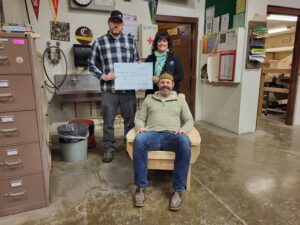 Tom Kain & Lucas Canney, CHS
Tom Kain & Lucas Canney, CHS
This grant purchased materials for over 100 students in our Fundamental Woodworking & Design classes to learn carpentry framing skills by crafting Adirondack chairs using typical framing lumber of 2×4’s and 2×6’s. Students crafted their chair using cutting & jointing techniques used when framing structures, learning some carpentry skills as well as building something useful they can take home and use with pride.
Sponsor: Morrison-Maierle
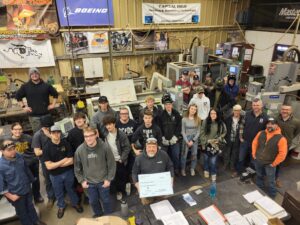 Ted Riehl & Jim Weber, CHS
Ted Riehl & Jim Weber, CHS
Capital High Welding teachers bought reliable, state-of-the-art welding helmets to allow students to focus on developing technical skills without safety concerns, fostering confidence and proficiency in their work. These helmets replaced outdated equipment, many of which had compromised visibility and safety features, ensuring the safety and comfort of the students while enhancing their educational experience. Welding is a high-demand skill that requires specialized safety equipment to protect students from sparks, UV rays, and intense light. The new helmets provide 70-80 students access to modern equipment that aligns with industry standards.
Sponsor: Dick Anderson Construction
 Claire Pichette & Missy Sampson, HHS
Claire Pichette & Missy Sampson, HHS
HHS AP Environmental Science and Biology II took a field trip to the Mannix Ranch near Helmville, the Blackfoot Challenge in Ovando, and the Rich Ranch in the Seeley-Swan area. They learned about community and watershed-level conservation, public lands, natural resource management, and how to make sustainable small businesses work in our rural economies. They completed a citizen science project with USFS biologists, interviewed a taxidermist, and toured a wooden bowl-making shop at Swan Woods in Ovando. They also learned about managing an outfitting business and dude ranch and stocking a private pond with native cutthroat trout. (98)
Sponsor: William Walter, HHS 1962
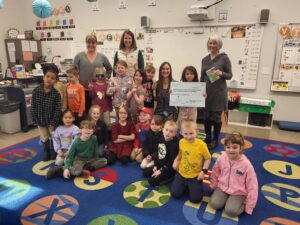 Jill Downing, Jen Jenkins, Chelsi Ebelt, Debbie Gomes, Liesel Loveridge, & Scott Herzig, Central Elementary School
Jill Downing, Jen Jenkins, Chelsi Ebelt, Debbie Gomes, Liesel Loveridge, & Scott Herzig, Central Elementary School
“Window into the World” is an initiative that encourages and supports language learning and nurtures a sense of belonging by using heritage as a lens to engage the entire student body. A variety of new tools ranging from phonics bingo to world flags helps students imagine where people originated, which bridges gaps and invites connection among students. This grant funded the purchase of materials to create individualized lesson plans for multilingual learners as well as materials that encourage students to consider various perspectives, experiences, languages, points of view, and ways of looking at the world. (98)
Sponsor: Peter Funk and Jeanne Underhill
 Jonathan Driggers, HHS
Jonathan Driggers, HHS
This grant funded the purchase of a high-quality 3D printer and accompanying materials to enhance hands-on learning in the computer science classroom. The printer is primarily used to fabricate custom parts for robotics projects, allowing students to design, prototype, and build functional components, fostering creativity and practical problem-solving skills. Additionally, the printer supports interdisciplinary projects, such as creating teaching aids, engineering prototypes, and artistic designs, broadening the scope of STEM education. By integrating 3D printing into the curriculum, this initiative aims to empower students with cutting-edge technology, preparing them for future academic and career opportunities in innovative fields. (98)
Sponsor: Nancy Cormier
 Jennifer Skogley + 13, Broadwater
Jennifer Skogley + 13, Broadwater
Broadwater students have been dancing the night (or day) away with Cohesion Dance Studio! This grant provided the funds for a 4-month Cohesion Dance residency at Broadwater Elementary school. All students in grades K-5 participate in various workshops that introduce them to the incredibly versatile art of dance. Cohesion Dance workshops offer monthly lessons that focus on things like emotional regulation, collaboration, movement with school subjects, and body calming activities. In addition to the social-emotional and academic benefits, students also get exposure to the world of dance, an opportunity typically limited to after school classes. (95)
Sponsor: Pacific Source
 Kellie Boedecker, Mattea Erickson, Cara Heath, Amber Byrd, & Chelsea Kingston, Broadwater & CHS
Kellie Boedecker, Mattea Erickson, Cara Heath, Amber Byrd, & Chelsea Kingston, Broadwater & CHS
Broadwater purchased Trex materials and building supplies for CHS industrial arts students to construct benches that convert to picnic tables for Broadwater Elementary School’s outdoor learning habitat. The convertible units will provide years of safe, low-maintenance, versatile learning space that seats over 30 elementary students. Broadwater’s beautiful outdoor space is used daily and is a favored meeting location as well as a great place to read a book. It’s extra special to invite alumni, both staff and students, to collaborate in transforming a space many of them remember fondly into an improved outdoor classroom. (94)
Sponsor: Dowl
 Cassie Koch, HHS
Cassie Koch, HHS
This Spring, eight Culinary II students from Helena High embarked on an overnight journey to Montana’s culinary institutes, a trip that opened students’ eyes to many opportunities. To inspire our Helena students, the Helena High Culinary Arts teacher took them to the Flathead Valley Community College’s Culinary Institute of Montana and the Big Sky Culinary Institute in Missoula. At both institutes, students met head chefs, toured the facilities, learned about course offerings, and either enjoyed meals served by culinary students or got hands-on experience in a training kitchen. (88)
Sponsor: Benny’s Bistro
 Kimberly Helseth, Jim Darcy
Kimberly Helseth, Jim Darcy
This grant will fund the purchase of Makedo Invent STEM toolkits for Jim Darcy third grade students to use in engineering and constructing their own simple machines out of cardboard. These Makedo Kits allow students to sustainably reuse cardboard boxes, safely and easily engineering 3D cardboard structures that show forces and motion.
Sponsor: Robert Peccia & Associates
 Chelsea Segrest, Rossiter
Chelsea Segrest, Rossiter
Mrs. Segrest purchased copies of a favorite resource for working with kids with autism disorder so she can share the book, More Than Words: A Parents’ Guide to Building Interaction and Language Skills for Children with Autism Spectrum Disorder or Social Communication Difficulties, with Rossiter School staff to help support their work with students in her Special Education Pre-School Classroom. The books are also now available in a lending library for parents to check out and use with their children.
Sponsor: Mountain West Bank Endowment
 Adam Clinch, CHS
Adam Clinch, CHS
Logic and strategy-based board games foster critical thinking, problem-solving, collaboration, and math application. The games purchased with this funding–Five Crowns, Coup, Resistance, Codenames, Quoridor and Liar’s Dice–will engage students in post-AP Calculus exam activities, promoting social interactions and inspiring a life-long love of learning through interactive and enjoyable challenges.
Sponsor: Stockman Bank
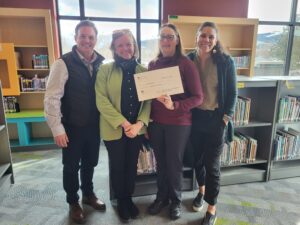 Joice Franzen, Bryant
Joice Franzen, Bryant
Words are powerful tools for building connections and expressing ideas. Picture dictionaries support language learners by pairing visuals with vocabulary in multiple languages, helping build connections with content areas and peers while strengthening language skills. They also nurture curiosity in students learning additional languages, encouraging exploration and engagement.
Sponsor: In honor of donations made by Helena Public School administrators
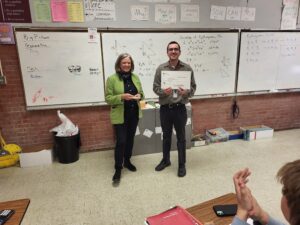 Jonathan Driggers, HHS
Jonathan Driggers, HHS
Robot Tour provided materials such as EMO Smart Car kits and Arduino Uno rev3 for students to construct and program robots. They use the robots first to navigate a maze, but then add additional components including speakers, sensors, lights, and claws. Students receive hands-on experience applying their coding knowledge to robotics, and learn new concepts in electronics and mechanics.
Sponsor: In honor of donations made by Helena Public Schools staff
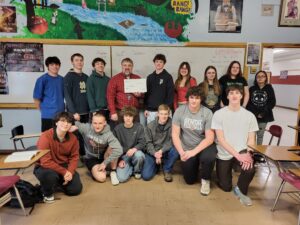 Randy Hussey, HHS
Randy Hussey, HHS
New gaming supplies and books–players handbooks, player screen, battle mat, dice, DM essential books–specific to Dungeons & Dragons are a boon to gamers and English students alike. These storytelling and interactive adventure materials serve multiple purposes in the English classroom–building skills such as referencing and writing–as well as in an after school club that offers community and improves school climate.
Sponsor: Karen and Hugh Zackheim
 Brenna Stefanik, Jim Darcy
Brenna Stefanik, Jim Darcy
Puzzling has many benefits such as encouraging task completion, perseverance, and concentration. This grant provided three puzzle boards, a variety of puzzles at different levels, and storage containers to third graders at Jim Darcy allowing students to work on puzzles in their free time or when finished with work without having to lose progress or pieces each time they need to transition. Students that catch on to new concepts quickly now have an activity that challenges them to focus and think critically, yet independently.
Sponsor: Sandra and Jerry Sept
 Juliann Solomon, Bryant
Juliann Solomon, Bryant
This grant equipped two 4th grade classrooms with more math board games, interactive clocks, and interactive math flash cards to enhance students’ learning while also making math fun. Games like Mathological Liar and Math Tac Toe give students the opportunity to learn math through play and interaction with their peers. Using games and manipulatives increases retention and raises engagement.
Sponsor: In Memory of Jack Copps
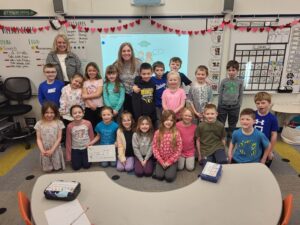 Talor LeBrun, Jim Darcy
Talor LeBrun, Jim Darcy
Building on a previous Spark Grant that created a popular independent reading station in her classroom, Ms. LeBrun used this funding to provide students with an exciting mixture of new non-fictional and entertaining tonies, characters that contain pre-downloaded audio-books. These characters allow all students access to reading, no matter their reading level. The reading station improves students’ experience by allowing them to listen to stories and explore individual interests.
Sponsor: In Memory of Jan Peccia
 Anna Alger, Jim Darcy
Anna Alger, Jim Darcy
Two portable Yoto Players and accompanying audio book cards allow for a listening station that promotes reading comprehension in this Kindergarten classroom. These child-friendly, rechargeable players give students a rotating selection of audio cards to choose from throughout the school year. As students spend time listening to stories–whether it is classics like Peter Rabbit, nonfiction series like Our Planet, or silly favorites like There was an Old Lady who Swallowed Some Leaves–they gain independence and a love of reading.
Sponsor: Opportunity Bank